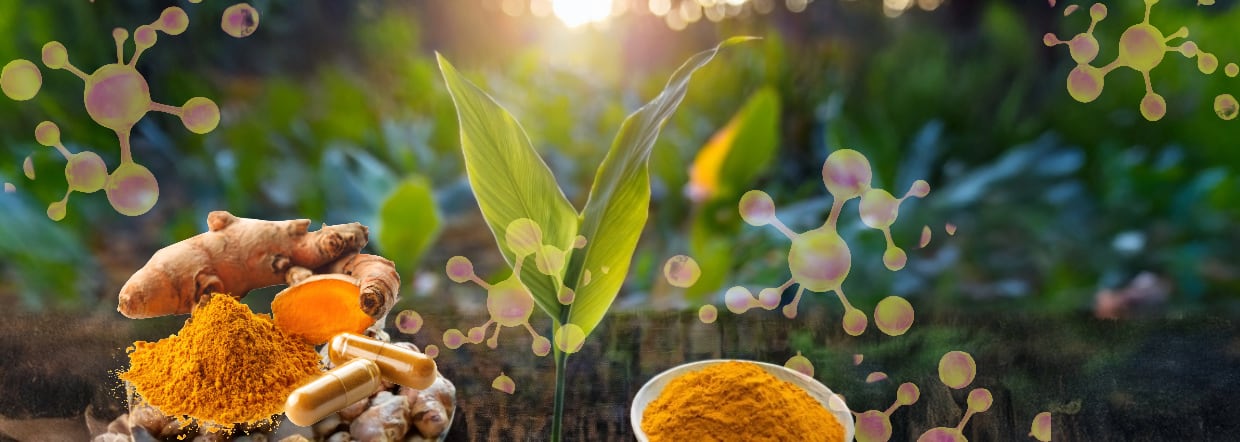Curcumin, a bioactive compound derived from the turmeric root (Curcuma longa), has been used in traditional medicine for centuries, particularly in South Asia, where it is valued for its anti-inflammatory and healing properties.
Its long history in Ayurvedic medicine and other herbal practices laid the groundwork for modern scientific research, as researchers began to explore whether its observed traditional benefits could be explained and validated through rigorous clinical study.
Over the past several decades, curcumin has attracted growing scientific attention, with several key breakthroughs shaping the field. Landmark studies in the 1990s revealed its ability to downregulate nuclear factor kappa B (NF-κB), a central regulator of inflammation, providing the first molecular evidence of its therapeutic potential. Building on this discovery, researchers later uncovered curcumin’s capacity to influence pathways linked to oxidative stress and protein aggregation, which sparked investigations into its possible role in slowing neurodegenerative conditions.
Today, curcumin research continues to advance across diverse domains of health. Its potential to support metabolic stability offers promise for those at risk of type 2 diabetes, while its neuroprotective properties may aid in maintaining healthy cognition with aging. At the same time, its broad anti-inflammatory properties position curcumin as a candidate for promoting systemic wellbeing, from cardiovascular health to joint function.
Driving this progress are companies, such as Verdure Sciences®, which are investing in rigorous, innovative studies to deepen scientific understanding and push the frontiers of curcumin research, ensuring its potential benefits are substantiated and accessible. Verdure Sciences’ Longvida® Optimized Curcumin® is created with solid lipid particle technology (SLCP™) to enhance the bioavailability of curcumin, ensuring greater absorption compared to standard Curcuma longa extracts, allowing systemic delivery of the compound and its benefits throughout the body.
How curcumin may support healthy metabolism
A clinical trial published in June 2025 offers new insights into the potential of curcuminoid supplementation for improving glucose regulation and gut health in older adults at risk of type 2 diabetes.¹ Conducted at Oklahoma State University and supported by Verdure Sciences®, the study evaluated the effects of Longvida®.
The 12-week, double-blind, placebo-controlled trial enrolled 28 pre-diabetic adults who were overweight/obese. Participants received either a placebo or a daily capsule delivering 80mg of curcumin. The primary endpoints focused on markers of glucose homeostasis, including hemoglobin A1c (HbA1c), fasting glucose, and insulin, while secondary outcomes assessed body composition, lipid profiles, liver enzymes, and gut microbiome composition.
One of the most significant findings was a measurable reduction in HbA1c among participants taking curcumin extract. This decline suggests that even a relatively low daily dose can positively influence long-term glycemic control, a key risk factor in the progression from pre-diabetes to diabetes. This improvement occurred without significant changes in fasting glucose or insulin levels, indicating that curcumin’s effects on glycemic regulation may operate through mechanisms independent of acute glucose responses.
The study also explored the relationship between curcuminoids and the gut microbiome, a growing area of interest in metabolic health. While overall microbial diversity did not shift significantly, the curcumin group showed modest enrichment in several bacteria commonly associated with improved metabolic outcomes, including Bacteroides and Roseburia. Though preliminary, these findings support the hypothesis that curcumin may contribute to better metabolic regulation in part by modulating the gut environment.
Boosting brain health
Research also indicates that curcumin may support brain health by reducing oxidative stress, modulating inflammatory pathways, and promoting neuronal function.² In preclinical models, curcumin has been shown to improve memory performance, enhance synaptic plasticity, and reduce the accumulation of amyloid plaques associated with cognitive decline.³
Verdure Sciences® was also involved in the development of a randomized, double-blind, placebo-controlled trial investigating the effects of Optimized Curcumin® on cognition and mood in 60 healthy adults aged 60-85.⁴ Participants received 400mg of Longvida® daily or a placebo for four weeks. Cognitive assessments included tasks measuring working memory, attention, and executive function, while mood was evaluated through validated self-report questionnaires. Blood samples were collected to monitor cholesterol levels and hematological safety markers.
Results showed that curcumin improved sustained attention and working memory compared with placebo. Following four weeks of daily supplementation, participants experienced significant enhancements in working memory and reductions in fatigue, alongside improvements in contentedness and calmness. Acute on chronic effects measured one and three hours after dosing also increased alertness and contentedness in participants.
Biomarker analysis indicated significant reductions in total and LDL cholesterol in the curcumin group, with no adverse effects reported on hematological safety measures. Overall, the study demonstrated that Longvida® was well-tolerated and associated with measurable improvements in cognitive performance, attention, and mood in healthy older adults, supporting its potential as a dietary intervention for brain health and healthy aging.
Systemic anti-inflammatory benefits
Curcumin’s ability to reduce inflammation also has implications for supporting longevity. Persistent inflammation in older adults is linked to tissue damage, impaired metabolic function, and increased risk of chronic diseases such as cardiovascular disease, type 2 diabetes, and arthritis.⁵ Curcumin acts on multiple inflammatory pathways, including inhibition of NF-κB and suppression of pro-inflammatory cytokines like IL-6 and TNF-α, while also counteracting oxidative stress that exacerbates cellular damage.
By modulating these processes, curcumin helps maintain vascular health, support joint function, and promote overall metabolic balance. Clinical studies indicate that curcumin can improve systemic markers of inflammation, enhance lipid profiles, and support healthy organ function.⁶ Regular supplementation may therefore contribute to healthier aging by reducing inflammation-driven damage, supporting physical resilience, and lowering the risk of age-related chronic conditions.
Curcumin’s anti-inflammatory properties can also benefit athletes and active individuals by helping to control excessive inflammatory responses, as shown in further research supported by Verdure Sciences®.⁷ Intense training and repeated physical stress can trigger inflammatory responses, leading to delayed recovery, muscle soreness, joint discomfort, and reduced performance. By modulating key inflammatory pathways and reducing pro-inflammatory cytokines, optimized curcumin® helps limit this overactivation, supporting faster recovery, maintaining joint and muscle health, and reducing the risk of injury. When combined with adequate rest and nutrition, Longvida® supplementation can be a natural strategy to manage inflammation and promote consistent, effective training.
Verdure Sciences® continues to support research exploring curcumin’s broad health benefits, building on clinical studies that demonstrate Longvida®’s effects on glucose regulation, cognitive function, and inflammation. By focusing on formulations that enhance bioavailability, Verdure Sciences® helps ensure that curcumin’s systemic benefits – ranging from metabolic balance to joint and vascular health – can be effectively delivered throughout the body. Ongoing efforts aim to extend Verdure Sciences®’ knowledge of how these functional effects can support overall wellness and healthy aging across diverse populations.
References
- Lamichhane, G.; et al. Twelve-Week Curcumin Supplementation Improves … Nutrients. 2025 Jul 3;17(13):2164.
- Lim, G. P.; et al. The Curry Spice Curcumin Reduces Oxidative Damage and Amyloid Pathology in an Alzheimer Transgenic Mouse. J. Neurosci. 2001 Nov 1;21(21):8370–8377.
- Wu, A. Dietary Curcumin Counteracts the Outcome of Traumatic Brain Injury on Oxidative Stress, Synaptic Plasticity, and Cognition. Exp. Neurol. 2006 Nov;197(2):309–317.
- Ferrucci, L.; et al. Inflammageing: Chronic Inflammation in Ageing, Cardiovascular Disease, and Frailty. Nat. Rev. Cardiol. 2018 Sep;15(9):505–522.
- El-Rakabawy, O. M.; et al. Curcumin Supplementation Improves the Clinical Outcomes of Patients with Diabetes and Atherosclerotic Cardiovascular Risk. Sci. Rep. 2025;15:28358.
- Cox, K. H. M.; et al. Investigation of the Effects of Solid Lipid Curcumin on Cognition and Mood in a Healthy Older Population. J. Psychopharmacol. 2015 May;29(5):642–651.
- McFarlin, B. K.; et al. Reduced Inflammatory and Muscle Damage Biomarkers Following Oral Supplementation with Bioavailable Curcumin. BBA Clin. 2016;5:72–78.








